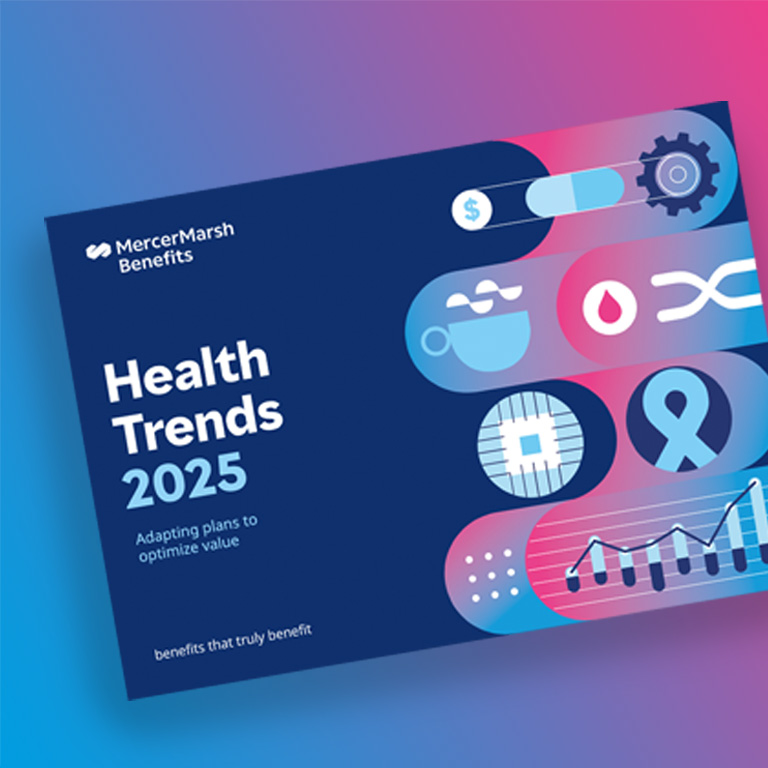
Jamil Kabbaj Renou
Risk Management and MMB Multinational Leader, UAE
-
United Arab Emirates
Employer-sponsored healthcare plan costs are rapidly rising. Our 2024 Health Trends research found that more than half of countries can expect to see double-digit rate increases over the average of 2022, 2023 and 2024.
The Middle East and Africa (MEA) data show the medical trend rate is expected to reach 14,4% in 2024 due to inflation, higher levels of utilisation and changes in treatment mixes.[1]
For instance, in the United Arab Emirates, higher claims utilisation and a preference for face-to-face care over telemedicine has resulted in a forecasted 2024 medical trend rate of 11%, more than five times the forecasted 2024 inflation rate of 2%. In Saudi Arabia the medical trend rate exceeds inflation by more than 7 times, with the 2024 forecasted medical trend rate of 15% to a 2.3% forecasted inflation rate. These increased costs are primarily driven by high claims utilisation in the Middle East, specifically from diseases of the circulatory system, as well as regulatory changes and demographic changes.
Meanwhile, in South Africa, a similar picture is emerging with a forecasted 2024 medical trend rate (9%) that is nearly double the forecasted inflation rate (4.8%), driven by high general inflation and a challenged public health system, which is resulting in greater use of private services.
In India, the 2024 forecasted medical trend rate is 11%, an increase of over 1% (9.6%) from 2023, while the forecasted 2024 inflation rate of 4.4%, once again putting pressure on the population to cover rising healthcare costs. Insurers in India are in fact expecting medical costs to rise by 15% in 2024, which is a contrast to global medical inflation which is expected to dip.
Although there are several key drivers for increased health trend rates and rising costs, the most significant concerns are utilisation changes and medical inflation. Eighty-seven percent of insurers in MEA, while seventy one percent in India believe high utilisation had a significant or very significant impact on 2023 medical trend, closely followed by medical inflation at ~83%.
Against this backdrop, employers and their advisors must negotiate with insurers to make sure sensible cost-containment measures; fraud, waste and abuse (FWA) controls, and claims-sharing features, are updated and competitive.
That means employers should to:
In the Middle East, the insurers that responded to the survey expect cost-containment measures to take precedence over plan design, with 57% of insurers saying that cost reduction will be prioritised over plan improvements (43%). In India however, enhancing benefits remains to be a priority while balancing it with cost containment measures. It’s critical however that cost reductions are valued well against the value that benefits provide to employees, ensuring that employers are able to retain and attract skilled talent.
To achieve this, employers should consider cost-sharing features such as:
Ideally, these features should be designed to encourage individuals to behave in a way that promotes a culture of health while also reducing plan costs; for examples of such behaviours include getting treatment on an outpatient basis when appropriate and seeking treatment from preferred network providers.
We believe cost sharing with plan members will continue to be needed to keep plan costs sustainable and plan management effective. However, these measures should be combined with better communication and improved access to preventive care.
Insurers are also focused on the application of AI to support future cost containment; for example, by detecting fraud, waste and abuse. Close to half (44%) of insurers globally are considering introducing this feature, including 60% in the Middle East and Africa.
Further, health systems in India are getting transformed with people moving to digital healthcare — including tele- or video consultations with doctors, wearable devices, and remote patient monitoring. Seventy per cent of insurers expect the use of AI for first-line diagnosis and navigation to have a transformative impact on employer-sponsored health care over the next five years.
Although cost-of-living crises and soaring inflation have affected both employers and employees, good-quality health plans remain crucial to business objectives for growth, including attracting, retaining, and engaging employees, and for contributing to broader societal and sustainability objectives.
A good starting point is to understand some of the key health issues driving the higher cost and frequency of claims. Health Trends 2024 data show diseases of the circulatory system, such as hypertension and cardiovascular disease, as the top cause of claims by both dollar amount and frequency in the Middle East, Africa, followed by cancer, and respiratory conditions, (as the top two and three by dollar amount, and respiratory conditions and musculoskeletal conditions as the top two and three by frequency.
In India, however, circulatory diseases, cancer and urology have been the top three in dollar amounts, while urology, eye and cancer are the top three in terms of frequency.
Employers can mitigate the risk of NCDs through prevention, diagnosis, treatment and workplace support.
For instance, physical inactivity, tobacco use, alcohol consumption, unhealthy diets and air pollution increase the risk of NCDs. Employers should ensure that their benefits encourage and provide preventive care, including health screenings.
Individuals may be unaware that they have a condition, in part, due to unaffordable testing and limited access to care. Employers should examine key barriers and consider navigation and advocacy services to help their employees access the healthcare they need. Equally important, employers must also consider benefits coverage gaps, including plan maximums, case management, prescription drugs and income continuation.
Of course, employees who are unwell need support as they perform or return to their duties. HR can help by creating accommodation policies and ensuring managers are trained on supervision of known or invisible conditions, including promoting anti-stigma team dynamics and communication.
Taken together with a focus on prevention, cost-sharing measures will help employers ensure their programs remain affordable — both at an organisational level and for their employees.
1 Trend rates for 2023 and 2024 are prospective. Unweighted global averages used. Data were gathered in August from 223 insurers, with medical trend rates submitted by insurers validated by our local teams using their own internal book-of-business data, country-specific insurer surveys and subjective assessments. Please note that the United States was not included in this research. For more information on the rates in the US, refer to this year’s National Survey of Employer-Sponsored Health Plans.
Source: MMB Health Trends 2024 report

Risk Management and MMB Multinational Leader, UAE
United Arab Emirates

Partner and Innovation Leader | Mercer Marsh Benefits
Canada

Article
13/10/2024
Marsh India Insurance Brokers Pvt Ltd is a subsidiary of Marsh McLennan.
Marsh shall have no obligation to update this publication and shall have no liability to you or any other party arising out of this publication or any matter contained herein. Any modelling, analytics, or projections are subject to inherent uncertainty, and the Marsh Analysis could be materially affected if any underlying assumptions, conditions, information, or factors are inaccurate or incomplete or should change. Insurance is the subject matter of the solicitation. For more details on risk factors, terms and conditions please read the sales brochure carefully before concluding the sale.
Prohibition of Rebates – Section 41 of the Insurance Act, 1938; as amended from time to time: No person shall allow or offer to allow, either directly or indirectly, as an inducement to any person to take or renew or continue insurance in respect of any kind of risk relating to lives or property in India, any rebate of the whole or part of the commission payable or any rebate of the premium shown on the policy, nor shall any person taking out or renewing or continuing a policy accept any rebate, except such rebate as may be allowed in accordance with the published prospectuses or tables of the insurer. Any person making default in complying with the provisions of this section shall be punishable with a fine which may extend to ten lakh rupees.
Marsh India Insurance Brokers Pvt. Ltd. having corporate and the registered office at 1201-02, Tower 2, One World Center, Plot-841, Jupiter Textile Compound Mills, Senapati Bapat Marg, Elphinstone Road (W), Mumbai 400 013 is registered as a composite broker with Insurance and Regulatory Development Authority of India (IRDAI). Its license no. is 120 and is valid from 03/03/2024 to 02/03/2027. CIN: U66010MH2002PTC138276
Compliance number: IND-20240916